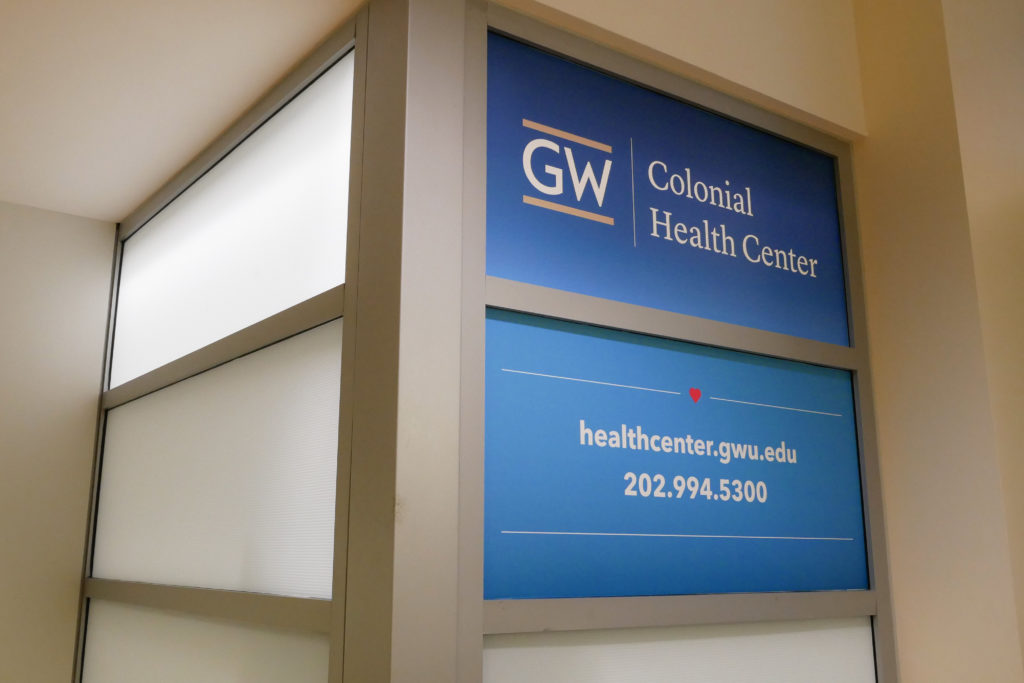Counselors in the Colonial Health Center are helping students track mental health progress and learn more about their condition through an app.
Officials launched the free WellTrack app – which includes functions like a mood tracker, informational video modules and a meditation feature – this semester after a student pilot period was carried out last fall. Students said the app’s launch demonstrates that officials are invested in prioritizing students’ mental health care needs outside of the physical CHC in the Marvin Center.
Saray Smalls, the senior health promotion and education program associate for the CHC, said the app is primarily designed for students with “low-level” stress, anxiety and depression and should not be a substitute for more intensive mental health treatment. She said students can consult WellTrack on their own or use the app in conjunction with other services the CHC provides, like in-person therapy or group sessions.
“What’s cool about WellTrack is it can be a part of step care and it can also operate beyond step care,” Smalls said. “It can be something that students access on their own without needing to do a walk in consultation.”
She said the app prompts users to complete a 27-question wellness assessment upon making a WellTrack account. Depending upon students’ answers to the quiz questions, the app determines whether the user is experiencing mild, moderate or severe levels of anxiety, depression or stress, Smalls said.
She added that the app directs students to resources like the CHC counseling hotline and Academic Commons to take the first steps to address their condition. Smalls said the health information the app provides can help students decide what kind of treatment and support they need.
“Maybe they’ve never known what depression is,” Smalls said. “And it feels valuable to know what they’re experiencing – they can put a name to it.”
She said the app includes features like a mood tracker – where students can log their emotional state at two random times a day – and a Zen Room, which allows students the option of guided and unguided meditation set to nature sounds like ocean waves. She said students can “personalize” the app according to their specific mental health care needs.
“WellTrack is not a replacement for individual therapy, but for our students that are like, ‘I’m kind of struggling and I just want to do something on my own, I feel like there’s something I can do,’” Smalls said. “That’s some of what WellTrack offers.”
Associate Dean of Students Colette Coleman said officials worked with WellTrack during the fall semester to bring the app to GW. She said the app will supplement existing mental health care services like individual and group counseling sessions.
“This provides another tool that our students can utilize to serve their needs,” Coleman said.
Coleman said CHC staff members are “targeting” the app to students who need mental health support for issues like academic-related stress but whose mental health needs may not necessitate frequent therapy sessions.
“For the therapists, it’s really to their call to decide and to determine what are the tools in the toolbox that will best help this student,” Coleman said. “It’s going to be different for every individual student.”
Coleman added that the app ensures that all students have access to mental health care services if they require them without having to worry about cost.
“We would never want for our students to not be able to have the care that they need because of funding,” she said.
First-year student Julia Hyatt – a member of Capital Peers, a peer education program that works with the CHC – said officials asked her and fellow Capital Peers to use the app every day for one week during the fall semester. She said officials requested that pilot participants connect their account with a Capital Peers counselor so CHC staff could track how students engaged with the app.
Hyatt added that the center’s staff asked members of Capital Peers for feedback about their experience using the app following the pilot period and to sign up to co-lead presentations about using the app.
“It’s actually helped decrease stress and helps you relax if you need it,” Hyatt said.
Senior and international affairs major Sarah Nema said using the app’s mood tracking feature gave her a more accurate idea of how her moods shift from day to day, which improved her outlook on her mental health.
“I overestimated how mad or upset I used to feel,” Nema said. “But then when you actually make it a habit to record your mood, you’ll see that, ‘Hey, life is actually as bad as I make it out to be.’ It gives you a better understanding of how you’re actually feeling and how you’re doing.”
First-year and environmental science major Lucy Hirsh said she has not used the app but added that it would benefit students who are unable to work around the counseling services hours and wait time. The counseling office is open from 9 a.m. to 5 p.m. with walk-in hours available from 1 to 4 p.m. Monday through Friday, according to the CHC website.
She added that the app may not be developed enough to assist all of students’ mental health needs.
“I’m not sure how completely developed it is because I know that there are other apps that provide similar resources,” Hirsh said. “However, if this one would provide more access to referrals, both within GW and outside of GW as a community, I can definitely see it being a cool opportunity.”
Freshman Lodos Durak said he hasn’t used WellTrack or any wellness app but appreciates that officials are taking an interest in students’ mental health and he will use it in the future.
“I’ve actually never used an app like that,” Durak said. “But I really do like GW’s actually caring about this stuff. And I would be open toward using it.”





